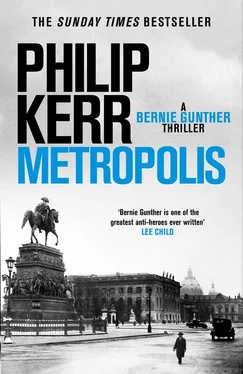‘Jesus,’ muttered Trettin.
‘Effectively, they’re both eugenicists, which is to say that the logical conclusion of their theories is nothing short of euthanasia, according to which, men who won’t work are not only a burden on society, but are psychopathic, unpatriotic and unworthy of life. They are war neurotics deserving only of extermination.’ Weiss replaced his pince-nez on his nose. ‘Now, tell him about the third victim, Bernie, if you would.’
‘Boss. Age forty-two, Werner Jugo lived with his wife in a basement in Meyerheimstrasse. Before the war he was a bus driver with the Berlin Transport Company. Joined the Twenty-Seventh Field Artillery Division in 1914. In 1918, he was hit by mortar fire at the Battle of Amiens.’
‘The blackest day of the German Army,’ muttered Weiss, quoting Ludendorff.
‘Lost an arm and both legs. After the war, he spent several years at Spandau Hospital. Then served a year in Fühlsbuttel Penitentiary in Hamburg for an assault on a prostitute.’
‘It’s an occupational hazard,’ said Trettin. ‘That is, if you’re a gartersnapper.’
‘We don’t know why he attacked her. He then spent a year in St Joseph’s Sanatorium.’
I paused for a second, acutely aware that this was the same place from which Otto Trettin had just returned. St Joseph’s was a monastery near the lake in Weissensee where Berliners were treated for cocaine addiction.
‘It’s all right,’ he said. His face was a thick-lipped rictus with a broken nose and large, cold dark eyes, a bit like a totem pole with piles. ‘I don’t mind talking about it. I had a little habit that got out of hand, that’s all. Well, you know how the hours are on a job like this. Up and down. Sometimes I needed a lift just to function. Anyway, all that’s behind me now. Thanks to the boss here.’
‘We’re glad to see you back in harness, Otto,’ said Weiss. ‘That’s what matters. And especially now.’
Gennat grunted and got up to adjust the clock on the wall of his office, which he did several times a day; it was an old railway clock and more decorative than useful. Every time I looked at it, it was wrong and there was a general suspicion that Gennat liked it that way, that it gave him an excuse to interrupt a meeting he wanted to end, and the fact was, he didn’t like Otto Trettin very much. He didn’t trust anyone who’d been addicted to drugs. While Gennat corrected and then rewound the clock, I carried on with my exposition of the case.
‘He may have been a beggar, but Werner Jugo was strongly suspected of having been a coke dealer. We found several grams of the stuff on his body. His wife, Magda, is an attendant in the ladies’ lavatory at the Excelsior, and it’s possible she also sells drugs. But given the two previous cases, we are of the opinion that the murder was not drug related. Like the two previous victims, Jugo was shot through the forehead at close range. The body was found under the station on Schönhauser Allee, still on his cripple-cart. This was just twenty-four hours after victim two was found dead. Again, no one saw or heard anything, with the noise of the train concealing the gunshot.
‘The day after Jugo’s murder, four Berlin newspapers — the Morgenpost , the Vossische Zeitung , the Lokal-Anzeiger and the Tageblatt — received an identical typewritten letter that claimed to have been written by the murderer. The letter to the Morgenpost was accompanied by an army cap on which was written Oskar Heyde’s name. It also contained his army number, which we have since checked with the Bendlerblock, and the Reichswehr have confirmed that the number is genuine.’
‘Which would seem to make the letter genuine also,’ said Weiss. ‘Incidentally, Gottfried Hanke, Kripo’s in-house typewriter and graphology expert, believes the letters were typed on an Orga Privat Bingwerke machine. Not only that, but he says the machine displays a defect in the horizontal alignment: the capital letter G prints to the right. I’ve asked Hanke to check out office-supply companies in Berlin to see if they have a record of sales of that particular machine. The postmark on the envelope was Friedrichshain, but I doubt there’s any significance in that. I live in Friedrichshain. Anyway, read the letter, Bernie.’
‘Dear Editor, This is the killer of the three disabled war veterans. But you can call me Dr Gnadenschuss. To prove I killed these men: I used a .25-calibre pistol and shot them through the forehead at close range. Close enough to burn the skin. I didn’t leave any spent rounds on the ground near the bodies. I shot the first man once, the second, twice, and the third three times. But the next man I shall shoot just once; and I will also take one of his medals, if he’s wearing any. Also in one previous case, I took a souvenir — a soldier’s forage cap — which I have enclosed in my letter to the Morgenpost . No exclusives here; sorry, gentlemen. His name was Heyde. The reason I have killed these three men should be obvious to anyone who calls himself a patriotic German. The men I shot were dead already and I was merely putting them out of their very obvious misery; while they existed they were not only a disgrace to the uniform, they also reminded everyone of the shame of Germany’s defeat. You’ve heard of the stab-in-the-back theory; well, these men represent a stab in the front. For everyone who sees them crawling around the sidewalks like rats and lice, they represent an affront to the human eye and to the very idea of civic decency. In short, I have only done what needs to be done if Germany is to begin to rebuild itself, to put the past behind it. The fact is, a new Germany cannot emerge from the ashes of the old while ragged, degenerate, crippled reminders of its ignominious past continue to haunt our streets like so many ghosts and ghouls. They are a burden on the state. A future in which the German Army assumes its rightful place in the nation’s destiny cannot begin until these obscene blots on the national landscape are wiped out. We all know that I am only stating what has been apparent for a long time. Besides, everyone knows that many of these malingering beggar veterans are fakes and frauds; I myself saw one get up and walk away from his cripple-cart as if his middle name had been Lazarus.
‘No need to thank me, so hold the applause. Anyway, you have been warned. I will kill more war cripples than the cops can count, so you can expect more blood on the streets of Berlin before very long. Not that the police can do anything. The cops, and more especially Berlin’s famous Murder Commission, know that they stand little or no chance of stopping me from carrying out these random attacks. Even if they were not the bunch of incompetent idiots that they are — did they ever catch Winnetou? No, of course not — they couldn’t stop me now. Real detective work is not what it once was in this city. Most of Kripo couldn’t catch a cold. You had better print this letter if you know what’s good for you. Heil Hitler. Yours, Dr Gnadenschuss.’
‘Any comments, gentlemen?’ asked Weiss.
‘It’s been two years since we had the Murder Commission,’ said Trettin. ‘He’s not very up-to-date with current police practice.’
‘Perhaps that’s just as well,’ said Weiss.
‘I’ve a comment,’ said Gennat. ‘And it relates to the very peculiar sort of anti-Semitism that’s demonstrated in this letter.’
‘There is no anti-Semitism in that letter,’ observed Weiss.
‘That’s what’s peculiar about it. This must be the first time anyone made a criticism of Kripo and the Murder Commission that didn’t make mention of the fact that there’s a Jew in charge of this department. Specifically, you. Especially when they’ve signed off with a Heil Hitler.’
Читать дальше












